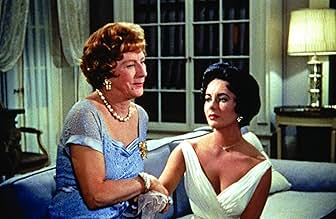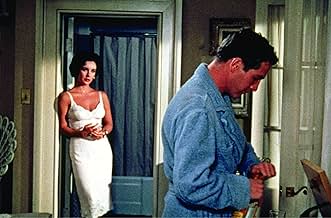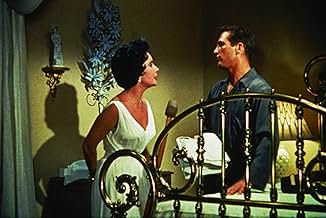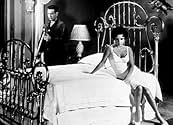Brick, ein alkoholkranker Ex-Footballspieler, trinkt den ganzen Tag und lehnt die Zuneigung seiner Frau Maggie ab. Die Wiedervereinigung mit seinem Vater, Big Daddy, der an Krebs stirbt, füh... Alles lesenBrick, ein alkoholkranker Ex-Footballspieler, trinkt den ganzen Tag und lehnt die Zuneigung seiner Frau Maggie ab. Die Wiedervereinigung mit seinem Vater, Big Daddy, der an Krebs stirbt, führt zu einer Vielzahl an Erinnerungen und Enthüllungen.Brick, ein alkoholkranker Ex-Footballspieler, trinkt den ganzen Tag und lehnt die Zuneigung seiner Frau Maggie ab. Die Wiedervereinigung mit seinem Vater, Big Daddy, der an Krebs stirbt, führt zu einer Vielzahl an Erinnerungen und Enthüllungen.
- Regie
- Drehbuch
- Hauptbesetzung
- Für 6 Oscars nominiert
- 3 Gewinne & 16 Nominierungen insgesamt
- Sookey
- (Nicht genannt)
- Boy
- (Nicht genannt)
- Buster
- (Nicht genannt)
- Child
- (Nicht genannt)
- Dixie
- (Nicht genannt)
- Pollitt Groom
- (Nicht genannt)
- Party Guest
- (Nicht genannt)
- Trixie
- (Nicht genannt)
- Sonny
- (Nicht genannt)
- Lacey
- (Nicht genannt)
Empfohlene Bewertungen
Three of the greatest cinematic performances placed on film.
The casting is brilliant:
Tennessee Williams's Big Daddy was indeed big - larger than life, domineering, insensitive, self-absorbed. Burl Ives's Big Daddy is larger than life, insensitive, domineering, self-absorbed. Ives is "on" every moment. And every moment is true.
Paul Newman's Brick, is as afraid of life as Big Daddy is in love with it. Yet, in his way, he's a chip off the old block - self-absorbed, insensitive.
And domineering or, as Big Daddy and Maggie would have it, masterful, ready to take charge -
if he could just get over himself.
I confess, I don't care for Elizabeth Taylor as an actress, but she is so right for the part, that I can't think of anyone else to fill it. Anyway, who else has eyes that could compete with Newman's?
Judith Anderson plays the typical Williams matron, living in her house of delusions. She's Big Daddy's tormented, desperately lonely, unloved partner, who towards the end wins Big Daddy with her nobility and devotion.
The under-appreciated Jack Carter has the unenviable role of Brick's pliant, conformist brother, Gooper, decent at heart but worn out after years of jumping through Big Daddy's hoops and still winding up on the short end, with a house full of brats, bred at Big Daddy's presumed bidding and delivered by a scheming, ambitious weasel of a wife. Gooper the only character I have a little trouble with, because his climactic speech, as rendered by Carter, is so heartfelt, that we are aggrieved with him at the injustice of Big Daddy's favoritism for the no-account but aesthetically more pleasing Brick.
Perhaps an even more unenviable role is that of Gooper's wife, played to perfection by Madeleine Sherwood. Anyone who has grown up in the South has known "Sister Woman". I can assure those who haven't, that this character is not a stereotype or caricature.
There are a few quibbles. One character, the family doctor, though played well by Larry Gates, has a dramatic function that's about as useful as the referee in a pro wrestling match, but not nearly as decorative. I guess he's included to provide plot information, but I think it could have been provided just as well without him. I was also put off by the contrived thunder claps at dramatic moments. Then, there were some continuity problems, such as different facial expression when shot angles were changed and Gooper's too many "Shut ups" to Sister Woman.
If, as another reviewer has said, Tennessee Williams hated this film, then it couldn't have been because it was untrue to his work. If he disliked the changes and omissions, he should blame '50s prudishness, not the film, for dictating, say, the suppression of Brick's homosexuality.
Williams wrote about lies and delusions, the good ones and bad ones. Well, that's what Cat on a Hot Tin Roof and Streetcar Named Desire and Glass Menagerie were all about. Tennessee Williams's stories about the South and its culture of delusion are not just rebukes of Southern hypocrisy and bloodymindedness but paeans to the gentle and genteel refuge which delusion provides. As Maggie "The Cat" says, "Truth, truth - everybody keeps hollerin' about the truth. Well, the truth is as dirty as lies."
Finally, I think it was brilliant of Richard Brooks to insist on color, for Williams's stuff is talky, and with the drabness of a typical Williams set, this can be a bit oppressive. With color, and the wonderful animation Brooks instills in all the characters, his Cat contains not a dull moment. If Brooks has given us something at odds with what Williams intended, I think he has given us something just as fine.
As with another notable Tennessee Williams play -- "A Streetcar Named Desire" -- they had to remove the references to homosexuality to bring the movie to the silver screen. Still, the scenes of Maggie (Taylor) in her slip seem as though they would have been risqué for the time. Along with her, just about every character made me feel as if my throat was going to constrict. In a way, it's as if the only truly benign characters were the servants.
All in all, I wouldn't call this movie a supreme masterpiece, but I found it to be worth seeing. This one, along with "Streetcar" and "Baby Doll" are the three great adaptations of Tennessee Williams plays. Also starring Paul Newman, Burl Ives, Judith Anderson (Mrs. Danvers in "Rebecca"), Jack Carson and Madeleine Sherwood (Reverend Mother on "The Flying Nun").
*This is going to sound insane, but prior to "COAHTR", the only movie in which I'd seen Elizabeth Taylor was the god-awful "Flintstones" movie, in which she played Wilma's mother.
Paul Newman and Elizabeth Taylor are both brilliant as Brick and Maggie Pollitt, respectively. Not very often is there a screen couple that have the same chemistry together that they do.
Newman, however, steals the show. If you watch "Cat on a Hot Tin Roof" for nothing else, watch it for his performance. One of the greatest actors of all time, Newman showcases how powerful an actor he can be. This is not to say the supporting cast isn't excellent. Burl Ives is superb in a supporting role as Big Daddy, a man who's greatest concern is having his legacy live on after him. The sequence with Ives and Newman in the basement of the house remains one of the most incredible displays of acting I have ever seen.
"Cat on a Hot Tin Roof" is a very appropriate title. It is a searing, wonderfully acted film that I will not soon forget. I recommend those who haven't seen it yet to rent it as soon as they get a chance. A true classic.
Wusstest du schon
- WissenswertesDespite being really affected by her husband Mike Todd's death, Elizabeth Taylor resumed her job in a very professional way, without any delay on the set. Everyone was astonished by her determination.
- PatzerAfter Brick tries to drive away and gets stuck, Maggie goes out to him and helps him into the house through the pouring rain. Her hair is soaking wet, but the next time she is seen, it's perfectly dry and styled.
- Zitate
Harvey 'Big Daddy' Pollitt: I've got the guts to die. What I want to know is, have you got the guts to live?
- VerbindungenEdited into Hollywood: The Dream Factory (1972)
Top-Auswahl
Details
- Erscheinungsdatum
- Herkunftsland
- Sprache
- Auch bekannt als
- Un gato sobre el tejado caliente
- Drehorte
- Metro-Goldwyn-Mayer Studios - 10202 W. Washington Blvd., Culver City, Kalifornien, USA(studio: made in Hollywood, U.S.A. by)
- Produktionsfirma
- Weitere beteiligte Unternehmen bei IMDbPro anzeigen
Box Office
- Budget
- 3.000.000 $ (geschätzt)
- Weltweiter Bruttoertrag
- 1.872 $
- Laufzeit1 Stunde 48 Minuten
- Farbe
- Seitenverhältnis
- 1.85 : 1
































